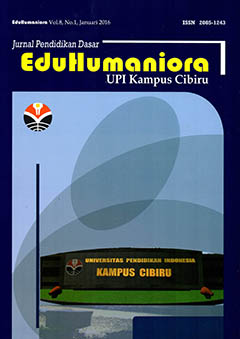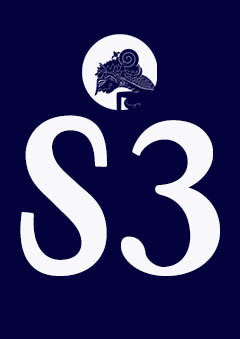PENGARUH ACCELERATED LEARNING BERBASIS MUSIK BAROK TERHADAP KEMAMPUAN MEMBACA PEMAHAMAN
Abstract
Abstract: Reading comprehension is flexible and sustainable cognitive and constructive process. Students 'understanding of reading content is still low, therefore there is need strategies to improve students' reading comprehension ability. One of strategy that can be used in reading comprehension learning is Accelerated Learning based on baroque music. Baroque music has no lyrics and neutral, besides that the baroque music have a strong influence on the ability to absorb information and memorize it. The purpose of this study was to determine differences in scores on the read comprehension ability of fifth grade students of elementary school before and after learning using Accelerated Learning based on baroque music. The design of this study uses nonequivalent control group with data collection techniques using test. The collected data were tested using Independent Sample t-test with a significance level of 5%. The results showed that there was a significant difference between the score of reading comprehension ability of fifth grade students of elementary school before and after learning using Accelerated Learning based on baroque music.
Keywords: reading comprehension, learning strategy, Accelerated Learning, baroque music
Abstrak: Membaca pemahaman adalah proses kognitif dan konstruktif yang fleksibel dan berkelanjutan. Pemahaman siswa mengenai isi bacaan masih belum optimal, oleh karena itu perlu adanya strategi untuk meningkatkan kemampuan membaca pemahaman siswa. Salah satu strategi yang dapat digunakan dalam pembelajaran membaca pemahaman adalah Accelerated Learning berbasis musik barok. Musik barok tidak memiliki lirik dan netral, selain itu musik barok memiliki pengaruh yang kuat pada kemampuan untuk menyerap informasi dan menghafalnya. Tujuan penelitian ini adalah untuk mengetahui perbedaan skor pada kemampuan membaca pemahaman siswa kelas 5 sekolah dasar sebelum dan sesudah belajar menggunakan Accelerated Learning berbasis musik barok. Desain penelitian ini menggunakan nonequivalent control group dengan teknik pengumpulan data menggunakan tes. Data yang terkumpul diuji menggunakan Independent Sample t-test dengan tingkat signifikansi 5%. Hasil penelitian menunjukkan bahwa ada perbedaan yang signifikan antara skor kemampuan membaca pemahaman siswa kelas 5 sekolah dasar sebelum dan sesudah pembelajaran yang menerapkan Accelerated Learning berbasis musik barok.
Kata kunci: membaca pemahaman, strategi pembelajaran, Accelerated Learning, musik barok
Full Text:
PDFReferences
Al Odwan, T. A. A. H. (2012). The effect of the directed reading thinking activity through cooperative learning on English secondary stage students’ reading comprehension in Jordan. International Journal of Humanities and Social Science, 2(16), 138-151.
Alvermann, D. E. and Earle, J. (2003). Comprehension instruction. In A.P. Sweet and C. Snow (Eds.), Rethinking reading comprehension. New York: Guilford.
Bethens, T. (2016). Accelerated Learning The Best Accelerated Learning Techniques To Learn More, Improve Memory, Enhance Intellect, and Process Information Faster.
Blake, D. (2014). Accelerated Learning Techniques for Beginners: Effective Tips to Improve Your Memory and Reading Comprehension, Learn More and Faster, Enhance Intellect. New York: United States of America.
Caldwell, J., S. (2008). Comprehension Assessment, a Classroom Guide. New York: The Guilford Pub.
Creswell, J. W. (2013). Research Design: Pendekatan Kualitatif, Kuantitatif, dan Mixed Methods. New York: SAGE Publications.
Dalman. (2015). Menulis karya ilmiah. Depok: Rajagrafindo Persada
DePorter, B., Reardon, M., & Nourie, S. S. (2005). Quantum Teaching Mempraktikkan Quantum Learning di Ruang-ruang Kelas. Terj. A. Nilandari. Bandung: Kaifa.
Effendi, M. (2016). Peningkatan Aktivitas Dan Hasil Belajar Matematika Melalui Model Pembelajaran Berdasarkan Masalah (Problem Based Learning) Pada Peserta Didik Kelas VI SDN 04 Nan Sabaris Tahun Pelajaran 2015/2016. Jurnal Konseling dan Pendidikan, 4 (2), 52-57.
Ganiron Jr, T. U. (2013). Application of Accelerated Learning in Teaching Environmental Control System in Qassim University. International Journal of Education and Learning, 2 (2), 27-38.
Gooden, B. R., Carreker, S., Thornhil, A., and Joshi, M. (2007). Instruction of metacognitive strategies enhances reading comprehension and vocabulary achievement of third grade students. The Reading Teacher, 61 (1), 70-77.
Gunawan, A. W. (2003). Genius Learning Strategy. Jakarta: Gramedia.
Jensen, E. (2008). Brain Based Learning. Terj. Narulita Y. Yogyakarta: Pustaka Pelajar. (Buku asli diterbitkan 2007)
Mason, R. (2004). Online education using learning objects. British Journal of Educational Technology, 35(6), 752-754.
Meier, D. (2000). The Accelerated Learning Handbook. New York: McGraw Hill Inc.
Oakhil, J., Cain, K., & Elbro, C. 2015. Understanding and Teaching Reading Comprehension: a Handbook. New York: Routledge.
OECD. 2018. PISA 2015 Results in Focus. Diperoleh dari situs https://www.oecd.org/pisa/pisa-2015-results-in-focus.pdf pada tanggal 15 Mei 2018.
Rose, C. & Nicholl, M. J. (1997). Accelerated Learning for the 21st Century The Six-Step to Unlock Your Master-Mind. New York: Dell Publishing.
Sari, A. A. 2015. Using Structural Equation Modeling to Investigate Students’ Reading Comprehension Skills. Elementary Education Online, 14 (2), 511-521.
Somadayo, S., dkk. (2013). The Effect of Learning Model DRTA (Directed Reading Thinking Activity) Toward Students’ Reading Comprehension Ability Seeing from Their Reading Interest. Journal of Education and Practice, 4 (8), 115-122.
Tuckerman, B. W. (2003). The effect of learning and motivation strategies training on college students’ achievement. Journal of College Student Development, 44(3), 430-437.
Woolley, G. 2011. Reading Comprehension Assisting Children with Learning Difficulties. New York: Springer Science.
DOI: https://doi.org/10.17509/eh.v11i1.14055
Refbacks
- There are currently no refbacks.
Copyright (c) 2019 EDUHUMANIORA: Jurnal Pendidikan Dasar
EduHumaniora: Jurnal Pendidikan Dasar
Published in collaboration Program Studi PGSD UPI Kampus Cibiru
and
HDPGSDI
This work is licensed under a Creative Commons Attribution-ShareAlike 4.0 International License.















